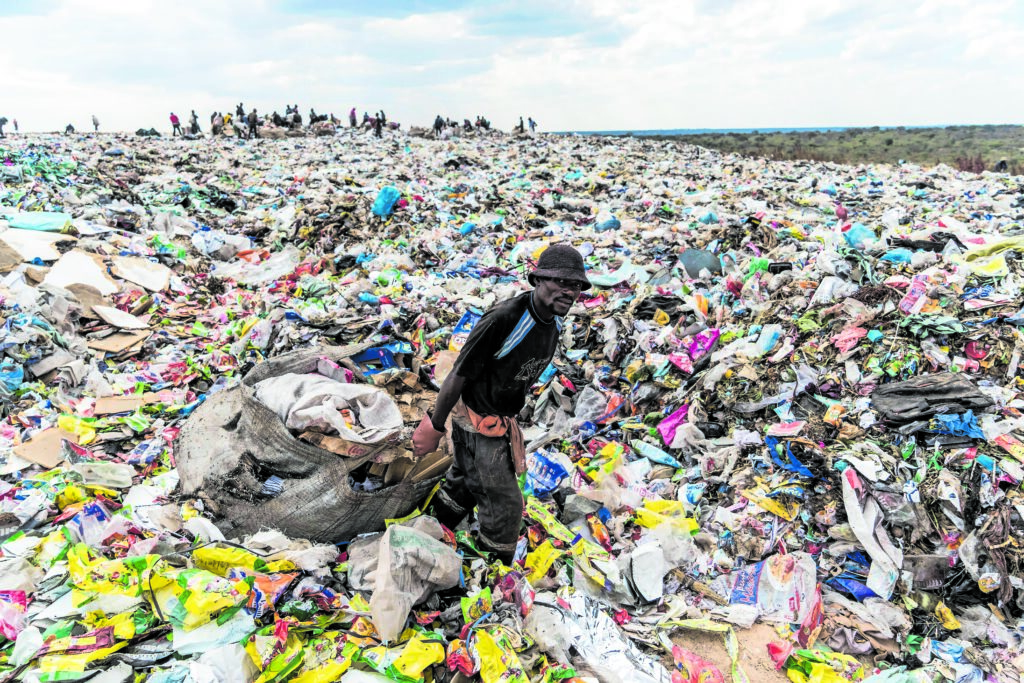Innovative: Engineer Nzambi Matee left her job in the oil sector to make bricks by recycling plastic waste. Photo: What Design Can Do
Making bricks from plastic waste is an unusual venture in Kenya and when Nzambi Matee quit her engineering job in the oil sector to take on plastic pollution, her friends and family were sceptical.
But now her brick-making social enterprise Gjenge Makers is recycling tens of thousands of kilograms of plastic waste every year.
What inspired you to make bricks from plastic waste?
There is litter everywhere. Plastic litter is not only a Kenya problem, it is a worldwide problem. My thought process revolved on what I could do to take plastic and convert it into something that is practical and useful for my community. The only practical and useful category I could think of is the basic needs [of] food, shelter or clothing. So, I settled for shelter. My goal was to look at ways of converting plastic waste to assist in the provision of shelter in the housing space.
[My friends and community] found it very strange. In the beginning they were confused, but I challenged them and told them to wait and see. Five years down the line they understand what I meant.
 A recycler drags a huge bag of paper sorted for recycling past a heap of non-recyclable material at Richmond sanitary landfill site on 2 June 2018 in the industrial city of Bulawayo. – Plastic waste remains a challenging waste management issue due to its non-biodegrable nature, if not managed properly plastic end up as litter polluting water ways, wetlands and storm drains causing flash flooding around Zimbabwe’s cities and towns. Urban and rural areas are fighting the continuous battle against a scourge of plastic litter. On June 5, 2018 the United Nations mark the World Environment Day which plastic pollution is the main theme this year. (Photo by Zinyange Auntony / AFP)
A recycler drags a huge bag of paper sorted for recycling past a heap of non-recyclable material at Richmond sanitary landfill site on 2 June 2018 in the industrial city of Bulawayo. – Plastic waste remains a challenging waste management issue due to its non-biodegrable nature, if not managed properly plastic end up as litter polluting water ways, wetlands and storm drains causing flash flooding around Zimbabwe’s cities and towns. Urban and rural areas are fighting the continuous battle against a scourge of plastic litter. On June 5, 2018 the United Nations mark the World Environment Day which plastic pollution is the main theme this year. (Photo by Zinyange Auntony / AFP)
You left what some would consider a very financially rewarding sector and moved to a sector that is relatively unknown in Kenya.
I believe in going where no one else has gone. That is what I believe is my purpose. My belief is that this is my way of making a dent in the universe.
It is a costly affair. You have a lot of upfront costs. I decided to go step by step. I started by manufacturing one brick. After that I thought, ‘Now that I have made one brick what do I need to make a thousand bricks? I need machinery.’ I saw the cost of the machines and realised that I could not afford them. So, I decided I would build the machines. I found a team of good smart people and we have pushed on slowly.
Do you feel that what you are doing helps improve the environment?
I choose to believe that it has an impact. I might see the impact when I am as old as my grandmother. Maybe I might not live to see the impact, but my hope and prayer is to make the drop that would have a ripple effect to the next generation and society.
In 2020 you received the Young Champion of the Earth award from the United Nations Environment Programme. The award also provided you with an opportunity to receive mentorship.
I think mentorship should be part of the core of every society. It is learning from someone else’s lesson. I would say I am a proud recipient of mentorship, both within the business environment and personal environment. Mentorship helps in making work easier and propels you in the right direction, which leads to quicker progress. I’m currently mentoring my own team at Gjenge Makers.
This piece was produced by SciDev.Net’s Sub-Saharan Africa desk. The original can be found here.